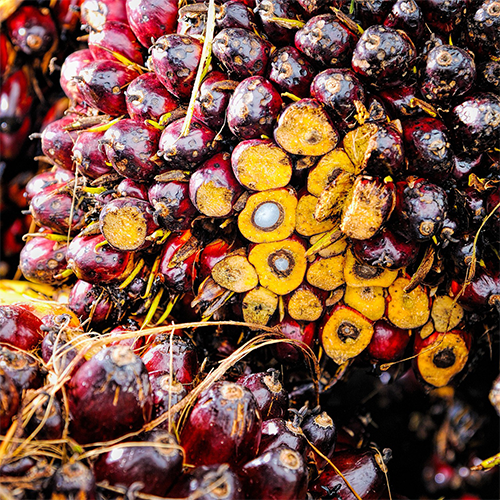Palm oil
The problem with palm oil
- International Union for Conservation of Nature (IUCN) – Issues Brief: Palm Oil and Biodiversity [external]
- WWF – Which Everyday Products Contain Palm Oil [external]
- The Guardian – How the World Got Hooked on Palm Oil [external]
- For an in-depth review see – Oil palm and biodiversity: A situation analysis by the IUCN Oil Palm Task Force [external]
Dr Fiona Borthwick explains the complex landscape of palm oil production and methods of sustainable development for the future.
Choosing products that contain RSPO-certified palm oil, and reducing oil consumption are two possible actions to take personally.
What is the University doing?

While the University does not buy palm oil directly, its prevalence in manufactured goods means that many of the food and cleaning products used on campus will contain palm oil or other oil palm-derived ingredients.
In May 2019, the University Executive passed a Palm Oil Policy setting out our commitment to purchase products made from sustainable palm oil that meets high standards of environmental protection, community relations and workers’ rights. This means palm oil is certified by a rigorous and independently-verified certification scheme that is based on multi-stakeholder participation.
Palm Oil Policy
Read our briefing for more insights into our approach. The briefing below provides further background and information about our policy position.
Our Palm Oil Policy was developed by the University’s Department for Social Responsibility and Sustainability (SRS), the Department for Accommodation, Catering and Events (ACE), the Estates Department and the Procurement Office. We also collaborated with students and spoke to academics to understand the University’s options.
The Policy builds on previous commitments to sustainable supply chains:
- Our Procurement Strategy 2016 – 2021, aims to ’embed ethical, social, environmental policies within procurement practices’.
- Our Good Food Policy 2016 includes a commitment to ‘source food and drink that is produced to the highest environmental, social and economic standards.’
It is only appropriate as Sustainability Institution of the Year 2018 (Green Gown Awards) that the University has committed to a new Palm Oil Policy. Through changing our purchasing practices we seek to realise all opportunities to remove non-certified palm oil from our food and cleaning products, and to find ways to reduce demand for these oils as part of our ongoing commitment to provide healthy, freshly prepared food to our community.





Recent comments